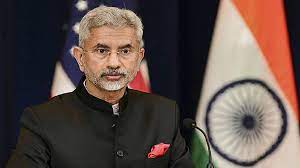
India-China Relations: Exploring the Munich Security Conference
India-China Relations: Navigating Diplomacy in Munich
India’s Foreign Minister, S. Jaishankar, recently attended the 60th Munich Security Conference in Germany, where leaders from various nations gathered to discuss global security issues. The conference became a focal point for diplomatic interactions, including an unplanned meeting between Jaishankar and China’s Foreign Minister, Wang Yi.
Key Participants and Unplanned Discussions
During the conference, S. Jaishankar’s presence was notable, attracting attention from global leaders. The unexpected encounter with China’s Wang Yi led to an impromptu discussion, elevating the dialogue beyond the conference sessions. Video footage of this interaction surfaced, providing a glimpse into the dynamics of the diplomatic exchange.
Video Footage and Public Reaction
The availability of video footage added a layer of transparency to the otherwise closed-door diplomatic discussions. The public, both in India and China, closely followed and interpreted the interaction between Jaishankar and Wang Yi, fueling speculations about the nature and outcomes of their conversation.
Recalling Previous Engagements and Global Participation
This meeting comes several months after the leaders last engaged during a conference in Jakarta. The Munich Security Conference witnessed participation not only from India and China but also from the U.S. Secretary of State, Antony Blinken, and other top global political figures. Interestingly, no official statements regarding the India-China discussions have been released, leaving room for media interpretations.
Ongoing Tensions and Diplomatic Channels
The backdrop of the Munich meeting is the ongoing tensions between India and China, which escalated in 2020 with border clashes in Eastern Ladakh. Diplomatic channels, including high-level military talks, have been employed to ease tensions and find common ground. The Munich Conference serves as a platform for higher-level diplomatic engagement.
Munich Conference Impact and Bilateral Relations
The Munich Conference holds significance not only for India-China relations but also for global security discourse. Evaluating the impact of such conferences on bilateral ties becomes crucial, especially in the context of the complex and multifaceted relationship between the two Asian giants.
Economic Collaboration and Regional Stability
Examining economic ties alongside diplomatic engagements is essential. How these discussions influence trade and commerce between India and China becomes a key aspect to consider. Additionally, the role of both countries in maintaining regional stability and its implications for neighboring nations is a subject of interest.
Future Prospects and Conclusion
As we look to the future, the Munich Security Conference discussions may play a pivotal role in shaping India-China relations. The potential for improved ties, the resolution of conflicts, and the impact on regional stability will undoubtedly be closely watched.
In conclusion, the Munich Security Conference serves as a crucial arena for diplomatic discussions, bringing together leaders from across the globe. The unplanned meeting between India’s Jaishankar and China’s Wang Yi has added a new dimension to the ongoing India-China relations, sparking both curiosity and speculation. global leaders to discuss pressing security issues.
Read More: How Climate Change and Policy Blunders Created a Massive Daal Shortage in Pakistan

 Share
Share



